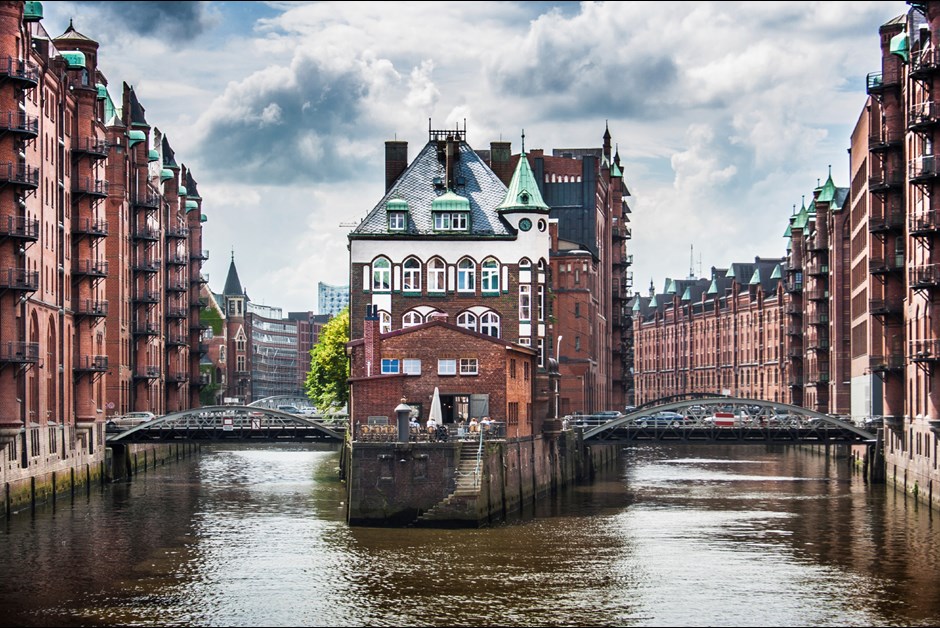Historic Hamburg
Overlooking the Elbe river, Hamburg is a city shaped by 1,200 years of turbulent history. Once an important member of the Hanseatic League, a medieval trading confederation, life in Germany's second biggest city has always evolved around its harbour. Today, Hamburg is an international media and culture hub, shaped by its waterways and known as Germany's "gateway to the world."

Fairmont Hotel Vier Jahreszeiten is a European grand hotel reflecting Hamburg's timeless elegance. Located on the shore of Inner Alster Lake, in the heart of the city, it has served as a home away from home for illustrious guests since its opening in 1897, from Prussian royalty to renowned opera singer Maria Callas.


Begin your journey into Hamburg's past on a boat trip on the Inner and Outer Alster Lakes, Hamburg's central recreational areas. The historic steamboat St. Georg departs only five minutes from the hotel, and the concierge is happy to assist you with reservations.
The Alster isn't the city's only major waterway. Traversed by a network of streams and canals, Hamburg boasts more bridges than Venice and Amsterdam combined. Overlooking the romantic Alsterfleet canal are the white arcs of the Alsterarkaden, waterside colonnades invoking a Mediterranean flair in the windy northern German city. Beautiful Art Nouveau Mellin Passage, Hamburg's oldest shopping mall, connects the Alsterarkaden with Neuer Wall, one of Europe's most exclusive shopping streets. The magnificent Neo-Renaissance Town Hall, proof of Prussia's wealth after the victory in the Franco-German War and proclamation of the German Empire, is just across the canal.

Take a break at one of the restaurant terraces lining Alsterfleet canal, where you can sip a refreshing Alsterwasser (Hamburg's trademark shandy made of equal parts beer and carbonated lemonade) while watching the swans float by. Once recharged, stroll along the Alsterfleet to the Speicherstadt. Built between 1883 and 1927, the Speicherstadt is a UNESCO World Heritage Site. Today, the Neo-Gothic red brick warehouses are home to such museums as the Miniatur Wunderland, the world's largest model railway museum that fascinates young and old alike. Nearby, the International Maritime Museum is dedicated to maritime art and model ships, documenting 3,000 years of maritime history in Hamburg's oldest preserved warehouse.

New history is written on the opposite side of the shore, where the sleek brick and glass architecture of the Elbphilharmonie makes for a stunning skyline. Sitting on top of an old warehouse building, the wave-shaped concert hall is scheduled to open in early 2017 and aims to enchant music enthusiasts with groundbreaking sound technology. The Elbphilharmonie is part of Hamburg's HafenCity, a large-scale inner-city regeneration project on the Elbe river islands. The heritage-protected Kesselhaus displays models of the current and future state of Europe's biggest urban development project.
From the HafenCity, it's only a short walk along the Elbe river to the Landungsbrücken harbour promenade. Moored at the pier is the three-masted baroque Rickmer Rickmers, a museum ship whose maiden voyage in 1896 predates the opening of Fairmont Hotel Vier Jahreszeiten. In the 19th century, immigrants from Germany and Eastern Europe flocked to the port of Hamburg to embark upon a one-way journey to the New World. Boats departing from the floating Landungsbrücken piers tour the busy harbour and picturesque Speicherstadt canals. Ask the concierge to arrange an English language harbour tour. Every year in May, Hamburg celebrates the biggest harbour festival in the world, with ship parades, live music, local food and more.

As a port city, Hamburg has always seen seafaring men come and go. During shore leave, they flocked to the nightlife district just outside the city's medieval borders. Dubbed the "most sinful mile," Hamburg's Reeperbahn is Europe's largest red-light district. In the 1960s, various clubs on the Reeperbahn hosted a then little-known band from Liverpool, launching The Beatles into the musical stratosphere. John Lennon famously claimed that he "grew up in Hamburg," and Reeperbahn tour guides share real and fictitious legendary stories about The Beatles even today. Nightclubs and varietés line the mile and surrounding streets of St. Pauli district. St. Pauli is also known as a theatre hub and home to the Operettenhaus, where the 1986 German premiere of the musical Cats established Hamburg as the country's musical theatre capital. Nearby, Schmidt Theater and Schmidts Tivoli offer cabaret, revue and satirical shows.
If you don't yet feel like returning to the comforts of your room at the Fairmont Hotel Vier Jahreszeiten after a long Saturday night out on the Reeperbahn, head back toward the Elbe river. A mile downstream from the Landungsbrücken is the Fish Auction Hall. Hamburg's Sunday fish market is steeped in 300 years of tradition and is a must-see in the Hanseatic city. Beginning at 5am in summer and 7am in winter, the market features food and gift vendors as well as live bands playing jazz and country music. Being up at the crack of dawn is essential if one wants to experience the spectacle, as stalls and shops close as early as 9:30am, a tradition that has carried on for hundreds of years. This closing time was once a compromise with the church, as after their work at the market, traders were supposed to attend 10am mass.

If you're looking for a bite, Hamburg's riverbank is home to many fine dining restaurants specializing in fresh seafood. For something sweet, stop into any bakery for Franzbrötchen, a cinnamon pastry that's a Hamburg specialty and the northern German counterpart to the French croissant. For lunch or dinner, head back to the Fairmont Hotel Vier Jahreszeiten, where the Jahreszeiten Grill offers delicious traditional Hanseatic dishes such as hearty Labskaus in an enchanting 1920s Art Deco setting.
Ready to see the world through both historic and modern German eyes? Contact hamburg@fairmont.com and prepare to be captivated by Hamburg's cosmopolitan flair and northern German charm.
